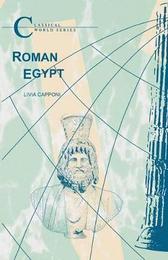
|
Roman Egypt
Paperback / softback
Main Details
| Title |
Roman Egypt
|
| Authors and Contributors |
By (author) Livia Capponi
|
| Series | Classical World |
|---|
| Physical Properties |
| Format:Paperback / softback | | Pages:96 | | Dimensions(mm): Height 216,Width 135 |
|
| ISBN/Barcode |
9781853997266
|
| Classifications | Dewey:932.022 |
|---|
| Audience | | Tertiary Education (US: College) | |
|---|
|
Publishing Details |
| Publisher |
Bloomsbury Publishing PLC
|
| Imprint |
Bristol Classical Press
|
| Publication Date |
27 January 2011 |
| Publication Country |
United Kingdom
|
Description
Egypt is by far the best-documented province of the Roman Empire. The dryness of its climate means that an enormous number of literary and documentary papyri have survived - a unique, reliable and lively source that documents Egypt in more detail than any other Roman province. Hitherto these have not been used extensively by Roman historians, on the erroneous assumption that Egypt is somehow 'atypical' as a Roman province. However, scholars now agree that Egypt should be devoted more attention by anyone interested in the history of the Roman Empire. This book offers a first approach to the subject, presenting a survey of the most important aspects of life in the province under Roman domination, from the conquest by Octavian in 30 BC to the third century AD, as they emerge from the micro-level of the Egyptian papyri and inscriptions, but also from the ancient literary sources, such as Strabo, Diodorus, and Philo, and from the most important archaeological discoveries.
Author Biography
Livia Capponi is Lecturer in Ancient History, University of Newcastle, UK.
ReviewsCapponi (ancient history, Newcastle U.) presents an introduction to Roman Egypt (Egypt became a Roman territory in 30 BC after it was conquered by Octavian and remained in Roman control until the third century AD)for high school students or undergraduates with no prior knowledge of the Classical world. He covers the conquest, forms of Roman exploitation, Byzantine Egypt and the end of Roman rule, cultural and social issues, Alexandria, Oxyrhynchus, and the Papyri. A map of Roman Egypt, a chronology and list of suggested further reading are included.
|